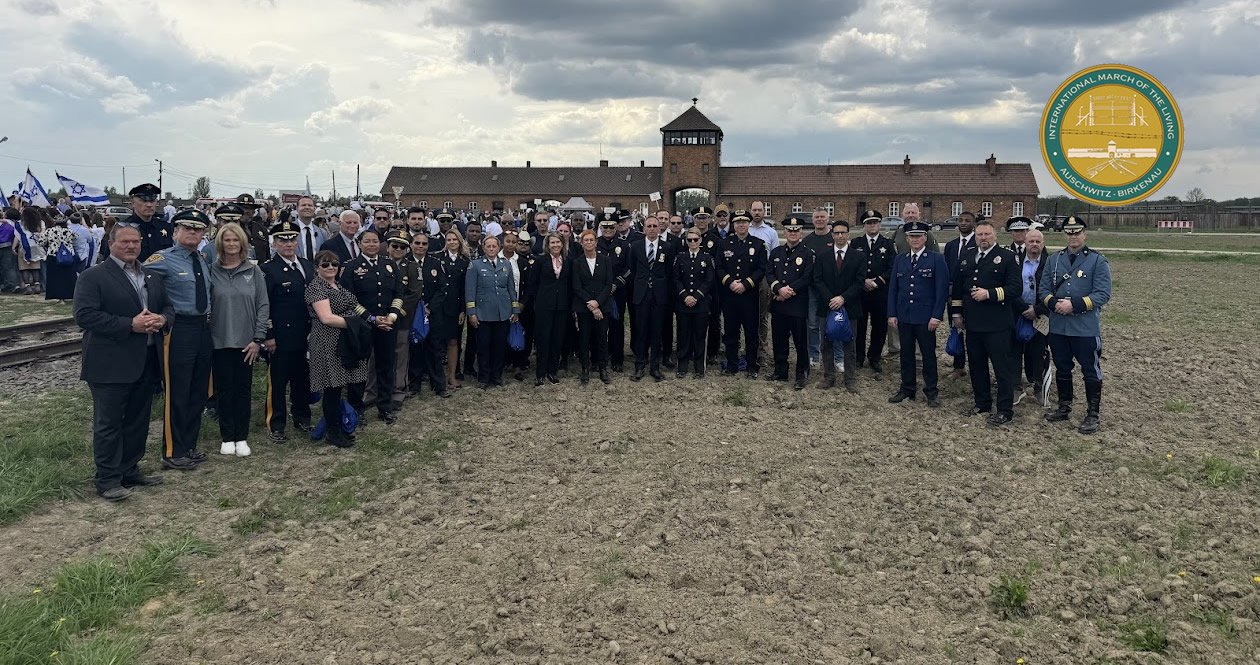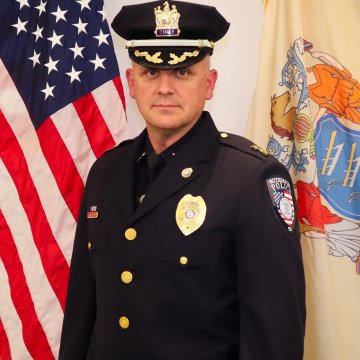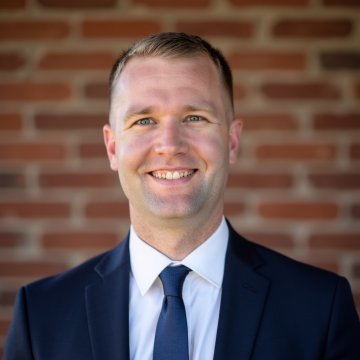

2026 Operationalizing Never Again
Interested in the program?
University of Virginia's Master of Public Safety course PSPS 5500: Contemporary Issues in Leadership: Policing in Nazi Germany includes a five-day experiential learning opportunity for students in Krakow, Poland. Industry professionals who are not UVA students may also participate. Learn more about this transformational experience.
About the Delegation
The delegation for Operationalizing “Never Again” brings together a distinguished group of public safety leaders, law enforcement executives, and policy experts committed to transforming remembrance into action. Rooted in the lessons of history and the enduring moral imperative of “Never Again,” this delegation equips police chiefs, sheriffs, and public safety professionals with the knowledge, context, and practical tools to identify early warning signs of dehumanization, prevent atrocities, and uphold human dignity in their own communities. Through immersive experiences, cross-national dialogue, and a focus on ethical leadership, the delegation embodies a commitment to ensuring that the promise of “Never Again” is not a slogan, but a standard of practice.
The program has garnered profound support:
|
Image

Phyllis Greenberg Heideman, President of the International March of the Living: "The Law Enforcement Delegation is a powerful representation, and testament to the commitment of those serving communities around the world, to ensure these atrocities never occur again." |
Image

Paul Goldenberg, Senior Fellow for Transnational Security at the Rutgers University Miller Center on Policing and Community Resilience: "This is an opportunity for leaders to reflect, learn, and take actionable steps to ensure accountability and ethical leadership in their organizations." |
Image

Marvin Ben Haiman, Executive Director of CPSJ: "This is more than a history lesson; it’s about equipping leaders with the skills to navigate ethical dilemmas and uphold justice in a rapidly changing world. This course and the experience of participating in the International March of the Living is a life-changing experience." |
About the Organizers
|
Image

|
Rutgers University Miller Center on Policing and Community Resilience focuses on improving the relationships between law enforcement and vulnerable communities through education, best practices, and research. Explore the Miller Center's mission. |
|
Image

|
University of Virginia Center for Public Safety and Justice serves as a hub for leadership development, research, and education in public safety, promoting innovation and public service. Learn more about the Center for Public Safety and Justice. |
Past Attendees
Click on any of the cards below to hear about the experiences of past attendees, who have represented dozens of countries and consist of executives representing numerous agencies.









Lieutenant Colonel Mark Cyr
In April, I had the privilege of participating in the March of the Living in Poland as a sworn law enforcement officer in uniform. It was an emotional and humbling experience, one I will certainly never forget. People approached me with tears in their eyes, expressing gratitude for my presence and support. The march was not only an act of remembrance, but also a way of operationalizing the promise of "Never Again." Standing alongside survivors, families, and communities, I was reminded that our presence matters, and that remembrance must be coupled with action to ensure the lessons of the Holocaust are never forgotten.

Chairman Jochen Kopelke
Jochen shared, "Completing this important high-quality program together with colleagues gives strength for its application in everyday life."

Chief John Russo
In 2025 I was honored to be part of a delegation chosen to represent law enforcement at the March of the Living and be part of the amazing learning opportunity titled “Operationalizing Never Again” presented by the Rutgers’s Miller Center for Policing and Community Resilience and the University of Virginia’s Center for Public Safety and Justice. Learning of law enforcement’s role in the atrocities of the Holocaust and then being able to walk in uniform side by side with survivors and families of those who suffered under the rule of Nazi Germany was a heartfelt and moving experience like no other.
This opportunity of a lifetime was a highlight of my professional career and I strongly encourage any law enforcement leader looking to ensure our profession is never again used against those we have sworn to protect, be part of an upcoming delegation.

Chief (Ret) Noel March
“Just when I thought that I knew Holocaust history, my understanding was challenged and my outlook on the future of policing was forever changed by walking among the ‘ghosts’ of the past….at Auschwitz”.

Deputy Chief Laura Lanham
The moment the opportunity landed in my inbox, I signed up without hesitation, but nothing could have prepared me for how deeply this experience would impact me. Standing in uniform at the very site where unimaginable atrocities occurred was humbling, sobering, and transformation. It wasn’t just a history lesson; it was a call to action. Being there held me accountable not only for remembering what happened 80 years ago, but for leading today with unwavering ethical standards and a steadfast commitment to our Constitution. “Never Again” is not just a phrase it is a responsibility we must carry forward.

Commissioner Karl Heeren
‘Every law enforcement leader should participate at least once in the March of the Living educational program. It is a profoundly life-changing experience that I wholeheartedly recommend. Participation not only enriches your understanding of history and human rights but also helps you grow into a more effective and compassionate police officer and individual.’ Says First Commissioner Karl Heeren from the Antwerp Police Department (Belgium) and co-founder of the program.
Why Every Police Leader Should Experience the March of the Living
If there’s one thing I can say with conviction, it’s that every law enforcement leader should take part in the March of the Living at least once in their career. This isn’t just another training or conference — it’s a life-changing experience that will stay with you long after you return home.
Here’s why I believe it’s so important:
1. It Brings Home the True Responsibility We Carry
The Holocaust shows us the devastating consequences when police and law enforcement lose sight of their duty to protect all people — especially the vulnerable. Walking through those historic sites, hearing survivor stories, you can’t help but feel a renewed commitment to uphold human rights and justice every single day.
2. It Teaches Us to Recognize Danger Early
The program opens your eyes to the warning signs of discrimination and hate — things we can’t afford to ignore. As leaders, we have the power to steer our forces away from becoming instruments of oppression and instead be champions of fairness and protection.
3. It Challenges You to Reflect Deeply on Your Role
Listening to survivors and standing in places where unimaginable horrors happened forces you to ask yourself tough questions: “What would I have done?” and “What must I do now to make sure this never happens again?” It’s a powerful reminder that ethical leadership isn’t optional — it’s essential.
4. It Builds Real Empathy and Understanding
This experience connects you with the stories of people who have suffered deeply, which in turn helps you lead with greater compassion and cultural awareness. That empathy makes a difference in how we interact with all communities and build trust.
5. It Creates Bonds Across Borders
You’ll meet police leaders from all over the world who share your commitment to justice and human dignity. The connections and shared sense of purpose you develop are invaluable — a global network of leaders ready to stand up for what’s right.
6. It Sends a Strong Message
By participating, you show your team and your community that you stand firmly against hatred in all its forms. It’s a visible, active way to lead by example and affirm your commitment to values that matter.
In short: The March of the Living isn’t just a program — it’s a powerful journey that transforms how you see your role as a police leader. It will make you not only a better officer but a better person. I can’t recommend it enough.
If you get the chance, take it. You won’t regret it.

Sheriff Eli Rivera
The opportunity to travel to Krakow, Poland to participate in the March of the Living with an international delegation of 65 law enforcement executives was emotional, solemn and an experience that I consider to be a pinnacle of my 37 years in law enforcement. Walking the grounds at Auschwitz and Birkenau with survivors and their families was a life-changing moment for me, prompting my promise to never, on my watch, as Sheriff, to allow the atrocities and genocide that occurred during the holocaust to happen again.

Chief Jeff Swoboda
Traveling to Poland as part of the International March Of The Living event was a deeply humbling experience that forever altered my perspective. Standing in the very places where police officers once aided in atrocities, I came to understand with heartbreaking clarity the profound influence supervisors have on shaping the actions-and ethics- of those they lead.
2026 Agenda
Arrival to Krakow Poland
Arrival to Krakow
Educational Program - (Overview of Police in Nazi Germany, Krakow History)
Historical background and context.
Facilitated discussion regarding law enforcement's role and impact.
-

Stephen Levine
Associate Dean for Academic ProgramsStephen Levine, PhD
Associate Professor and Associate Dean for Academic Programs
Stephen has taught U.S. cultural history at the University of Virginia (UVA) for the School of Continuing and Professional Studies (SCPS) and the Corcoran Department of History in the College and Graduate School of Arts and Sciences. He was a Scholar in Residence in the history department and then served as Senior Program Director for the Bachelor of Interdisciplinary Studies program, Senior Program Director for Undergraduate Degrees, and, since 2020, as Associate Dean for Academic Programs in SCPS.
When not at UVA, Stephen can often be found giving lecture performances or farming.
-

Marvin “Ben” Haiman
Executive Director, Center for Public Safety and JusticeMr. Marvin Haiman is an Assistant Professor and the Executive Director of Public Safety and Justice at the University of Virginia. He is also a Visiting Fellow and Research Scholar with Rutger’s University. Haiman served as the Chief of Staff for the Metropolitan Police Department of Washington, D.C. between 2021 and 2024. In this capacity, Haiman oversaw daily operations of the Executive Office of the Chief of Police and was responsible for broad agency management and implementing strategic agency objectives.
Haiman was responsible for several organizational units including the Office of Communications, Office of General Counsel, Office of Wellness and the Professional Development Bureau. He served as the Executive Director of the Professional Development Bureau between 2017 – 2021, leading the Recruiting Division, Metropolitan Police Academy Division, Human Resource Management Division, Disciplinary Review Division, Testing and Assessment Division, Equal Employment Opportunity Division, Office of Communications and the Strategic Engagement Office (Volunteer Services).
Prior to being named Executive Director, Haiman served in a variety of capacities between 2015-2017, including developing the agency’s Office of Volunteer Coordination, serving as Chief of Staff for the Technical Services Division tasked with a broad range of IT operations, and Chief of Staff for the Strategic Services Bureau supporting and leading the administration of police recruitment, training, policy and volunteer service matters for the Department.
Prior to returning to the Metropolitan Police Department, Haiman served as Director for the Homeland Security Advisory Council for the United States Department of Homeland Security, where he established several key task forces for the Secretary (e.g., Foreign Fighters, Integrity & Use of Force). Prior to his Federal service, Haiman led the Recruiting Division for the Metropolitan Police Department of Washington, D.C., among various other positions. Haiman was responsible for restructuring the sworn hiring process, decreasing the amount of time it took to process candidates while increasing the quality of those officers hired.
Haiman graduated from The Johns Hopkins University with a master’s degree in management through the Police Executive Leadership Program. He earned his undergraduate degree in mathematics from the University of Iowa and received designation as a Certified Public Management Program through George Washington University, as well as certification in Strategic Project Management. Haiman is also a graduate of the Naval Postgraduate School Center for Homeland Defense and Security’s Executive Leadership Program. He received recognition by the International Association of Chiefs of Police in 2020 as a 40 under 40 recipient and the prestigious Gary P. Hayes Award by the Police Executive Research Forum. Haiman graduated from the Metropolitan Police Academy and continues his police service as a reserve police officer with the Metropolitan Police Department. Haiman resides with his family in Washington, D.C.
-

Amir Mor
GuideBiography Pending
-

Ayal Beer
GuideAyal Beer is an educator with over 20 years of experience in developing and leading educational processes. He has worked extensively in pre-military academies, educational content development , and staff training, between 2021 and 2025 was part of an institute for experiential education. Today he serves as Head of Training at the Israeli Summer Camps Forum and as a pedagogical mentor at Migdalor, a center for education for liberal democracy. For more than a decade, Ayal has also been a licensed tour guide and has led educational journeys to Poland, specializing in meaningful, values-based learning experiences. He loves the desert, visits it often, prepares excellent homemade olives, and Lives on a Kibbutz in the Galilee.
Lunch Program
Walking Tour of Kazimierz
-

Amir Mor
GuideBiography Pending
-

Ayal Beer
GuideAyal Beer is an educator with over 20 years of experience in developing and leading educational processes. He has worked extensively in pre-military academies, educational content development , and staff training, between 2021 and 2025 was part of an institute for experiential education. Today he serves as Head of Training at the Israeli Summer Camps Forum and as a pedagogical mentor at Migdalor, a center for education for liberal democracy. For more than a decade, Ayal has also been a licensed tour guide and has led educational journeys to Poland, specializing in meaningful, values-based learning experiences. He loves the desert, visits it often, prepares excellent homemade olives, and Lives on a Kibbutz in the Galilee.
Dinner Program
Oshpitzin Jewish Museum in Oświęcim/Auschwitz
Educational Program - The Theatre of the World Through Arendt’s Eyes
In an era of polarization, disinformation, and weakening democratic norms, Christophe Busch—drawing on the political thought of Hannah Arendt—examines how truth is contested, public debate is narrowing, and shared reality is eroding through a process he calls “de-pluralization.” He explores the dangers of replacing facts with opinions and losing the ability to understand differing perspectives, informed by his work on collective violence and radicalization. Busch ultimately argues that the survival of democracy depends on protecting plurality, sustaining human dignity, and choosing to see one another as fully human amid complexity.
-

Christophe Busch
Director, Hannah Arendt InstituutDirector of the Hannah Arendt Institute Belgium. Focusing on perpetrator studies, polarization, radicalization, extremism, concentration camps, Auschwitz, media representation of camps and perpetrator photography.
Guided Tour of Auschwitz I
-

Amir Mor
GuideBiography Pending
-

Ayal Beer
GuideAyal Beer is an educator with over 20 years of experience in developing and leading educational processes. He has worked extensively in pre-military academies, educational content development , and staff training, between 2021 and 2025 was part of an institute for experiential education. Today he serves as Head of Training at the Israeli Summer Camps Forum and as a pedagogical mentor at Migdalor, a center for education for liberal democracy. For more than a decade, Ayal has also been a licensed tour guide and has led educational journeys to Poland, specializing in meaningful, values-based learning experiences. He loves the desert, visits it often, prepares excellent homemade olives, and Lives on a Kibbutz in the Galilee.
Dinner Program with March of the Living
VIP March of the Living Ceremony
Participation in the March of the Living 2026
Including tours Auschwitz I, Auschwitz II-Birkenau, Ceremony @ Birkenau
-

Amir Mor
GuideBiography Pending
-

Ayal Beer
GuideAyal Beer is an educator with over 20 years of experience in developing and leading educational processes. He has worked extensively in pre-military academies, educational content development , and staff training, between 2021 and 2025 was part of an institute for experiential education. Today he serves as Head of Training at the Israeli Summer Camps Forum and as a pedagogical mentor at Migdalor, a center for education for liberal democracy. For more than a decade, Ayal has also been a licensed tour guide and has led educational journeys to Poland, specializing in meaningful, values-based learning experiences. He loves the desert, visits it often, prepares excellent homemade olives, and Lives on a Kibbutz in the Galilee.
Private Group Dinner & Reflections
Departure
Departure for home.
Program Options
Credit Vs. Non-Credit
All participants will earn a certificate of completion but can choose to participate on a for-credit or not-for-credit basis. Differences between these options are highlighted below.
| Track | NON-CREDIT | THREE HOURS OF GRADUATE CREDIT |
|---|---|---|
| Deadline to Enroll | February 1, 2026 | January 1, 2026 |
| Tuition Costs | N/A | $1,887 (3 graduate level credits) + $36 off-grounds fee |
| MOTL Costs* | $2,500 pp + Airfare | $2,500 pp + Airfare |
| Classes |
February 2 – April 27
|
January 13 – April 28
|
| Credit | No credit awarded | Three hours of graduate credit issued by UVA |
| Certificate of Completion | Jointly issued by Rutgers and UVA | Jointly issued by Rutgers and UVA |
*Covers hotel lodging (4 nights), meals, ground transportation, security, programmatic fees, entrance fees (see detailed explanation of exact components)
PSPS 5500: Contemporary Issues in Leadership: Policing in Nazi Germany:
Students explore law enforcement's role in Nazi Germany, examining how policing enabled state-sponsored genocide and the ethical dilemmas officers faced. Students will walk from Auschwitz I to Auschwitz II in Krakow, Poland, connecting these historical lessons to modern law enforcement challenges. Focus on being an active bystander, ethical decision-making, and leadership under authoritarian regimes to prevent abuses of power and uphold justice and human rights.*
Transformative Experiences
Participants begin with pre-trip virtual seminars that delve into historical case studies, examining law enforcement's complicity during the Holocaust, with a focus on units such as Reserve Battalion 101. These sessions emphasize ethical decision-making and being an active bystander, equipping officers with the tools to uphold justice in today's complex societal landscape.
The on-site experience in Krakow, Poland, is both educational and deeply moving. Law enforcement officials from across the United States, Europe, and Canada join the March of the Living from Auschwitz to Birkenau. This participation serves as a powerful reminder of the consequences of unchecked hatred and the vital role of police in safeguarding human rights.

To be there [Auschwitz] and to be in uniform … it was not easy. We had kids thinking we were SS officers or Nazi soldiers. To see my own shadow on those cobblestone streets of Auschwitz was unnerving. It was uncomfortable....I sobbed. The magnitude of it all was heartbreaking. I am forever changed.
Operationalizing Never Again stands as a testament to the commitment of law enforcement agencies to learn from history and to embody the principles of justice, ethical leadership, and human rights. Through this program, participants are not only educated about the past but are also empowered to apply these critical lessons to their roles in contemporary society, ensuring that the atrocities of history are never repeated.
Event venue
All sessions and accommodations will take place at the modern and stylish PURO Kraków Stare Miasto, located near the city center. The hotel offers a unique blend of contemporary comfort and artistic charm, with easy access to cultural landmarks, dining, and nightlife. For all offsite sessions, coach bus transportation is included and provided.
Lodging options
PURO Kraków Stare Miasto
Ogrodowa 10, 31-155 Kraków, Poland
Airports
Kraków John Paul II International Airport (KRK) is the closest airport to PURO Hotel, approximately 25 minutes by car.
- Taxis and ride-share services are readily available outside the arrivals terminal.
- Public transportation options (bus or train) also connect directly to the city center.
Room block
A block of rooms has been reserved at PURO Hotel Kraków Stare Miasto and will be included in your registration for April 11 - 15, 2026. All guest rooms include complimentary Wi-Fi, access to the wellness and fitness area, and in-room amenities curated for comfort and relaxation.
Past Highlights
Highlights from the 2024 March of the Living
The role of police in the Holocaust
March of the Living 2023: Statement from Delegation of Chiefs of Police & Senior Law Enforcement Officials
Interested?
Operationalizing ‘never again’
*The information contained on this website is for informational purposes only. The Undergraduate Record and Graduate Record represent the official repository for academic program requirements.
Frequently Asked Questions
See answers to commonly asked questions below. Didn't find what you're looking for? Email mps@virginia.edu at any time.
- Travel Arrangements
-
Flights: MPS students are responsible for arriving at the designated airport (Kraków John Paul II International Airport [Code KRK]) and may fly from whatever airport and routing they choose.
- Arrive on Saturday, April 11, 2026.
- Flights must depart on Wednesday, April 15, 2026.
- Ensure that your passport is valid for at least six months beyond the travel dates.
- The cost of airfare is at your expense and any refunds are strictly per the terms of carriage you accept with the airline at time of booking. UVA is not responsible for cancelled or delayed flights.
Arrival in Poland: You will receive an individualized itinerary which will include instructions on group transportation to the hotel or instructions to take a taxi or Uber from the airport, upon arrival in Krakow, to the hotel.
- Accommodations
-
Hotel: MPS students will stay in a centrally located hotel in Krakow. We are working to finalize the hotel now and you will be in a four or five-star accommodation and four nights of accommodations are provided. MPS students will have the option to extend their stay (before/after 4/11-4/15) at their own cost of approximately $250 per night directly with the hotel.
Amenities: Breakfast and Wi-Fi will be included. Please ensure any dietary restrictions or special requirements have been communicated to Program Manager William Paige, qug5wg@virginia.edu, in advance.
- Packing Guidelines
-
Clothing: Pack layers suitable for the variable spring weather in Poland (raincoat, comfortable walking shoes, and warm clothing for outdoor activities). Generally temperatures fluctuate between 50°F to 62°F. We request that all uniformed members plan to bring and wear their “Class A” formal uniform attire for the March itself on April 24th and for any ceremonies. Additionally, members should bring business attire for the Ceremonial Dinner the night before.
Documentation: Carry a photocopy of your passport. It is also advisable to have an electronic copy saved on your phone.
Personal Items: Bring toiletries, medications, and any necessary electronics (note: Poland uses Type E plugs; bring an adapter).
Image
- Meals and Dietary Needs
-
Most meals will be provided as part of the program. MPS students should communicate any dietary restrictions or allergies in advance to Program Manager William Paige, qug5wg@virginia.edu, to ensure accommodations are made.
Snacks and water will be available during long excursions, but MPS students may wish to bring additional items.
- Program Activities
-
- 4/12/26 - Educational Tours: Guided visits to historical sites in Krakow, including the Krakow Ghetto. Participation is mandatory and will go through a dinner program in the evening.
- 4/13/26 - Educational Tours: Guided visits to historical sites in Oświęcim and a guided tour in Auschwitz I. Participation is mandatory and will go through a dinner program in the evening.
- 4/14/26 - March of the Living: MPS students will participate in a commemorative march from Auschwitz to Birkenau. Wear comfortable shoes and bring water. We request that all uniformed members plan to bring and wear their “Class A” formal uniform attire for the March itself. That evening there will be a dinner program as well.
Reflection Sessions: Daily group discussions led by UVA faculty and guides to reflect on experiences.
- Communication While Abroad
-
Contact Information: Program leaders (Ben Haiman and Steven Levine) will provide a list of emergency contacts, including their cell phones, local guides, and the U.S. Embassy in Warsaw along with Diplomatic Security Contacts.
Cell Phones: Verify that your phone plan supports international roaming. Alternatively, consider purchasing a local SIM card upon arrival in Poland. If you are a customer that uses AT&T FirstNet, contact your provider to enable a “Daily Travel Pass”. This pass generally costs $12 per day and allows existing service to work without interruption.
- Health and Safety
-
Insurance: Travel insurance is required as a part of the UVA delegation. UVA will secure insurance as a part of your course registration. You may consider supplemental/private insurance as well.
Health Precautions: Students should consult their physician regarding vaccinations or medications. Bring any necessary prescriptions in original packaging. Please see CDC guidance on vaccination recommendations: https://wwwnc.cdc.gov/travel/destinations/traveler/none/poland
Emergency Procedures: Upon arrival, a safety and security briefing will be provided and you are encouraged to familiarize yourself with the emergency meeting points provided by program leaders.
Safety: As this is a law enforcement contingent, we will have an assigned security detail to provide added safety for our delegation. Krakow is generally quite safe. For further information, please see the Department of State’s information about the destination: https://travel.state.gov/content/travel/en/traveladvisories/traveladvisories/poland-travel-advisory.html
- Cultural Expectations
-
Behavior: Respect local customs and sensitivities, especially at Holocaust memorial sites. Silence and solemnity are expected during visits to concentration camps as these are sites of mass suffering.
Language: While English is widely spoken, learning basic Polish phrases can be helpful. https://krakow.wiki/polish-language-learn-polish-phrases/
- Program Cost
-
Tuition and Program Fees: The program (lab) fee of $2,500 covers all costs of programming and most meals while on site in Poland during the program. This includes hotel accommodations, meals, entrance fees, security, local transportation, and guided tours. The lab fee is in addition to standard MPS tuition of $629 per credit hour and off-Grounds fees of $12 per credit hour.
Spending Money: MPS students may choose to budget for souvenirs, additional snacks, and personal expenses. Currency exchange to Polish Zloty (PLN) can be done at the airport or local banks, but major credit cards (e.g., Visa/Mastercard) are accepted widely.
- Pre-Departure Orientation
-
Mandatory Meeting: A pre-departure orientation session will be held virtually to review the itinerary, cultural expectations, and travel safety tips. Attendance is mandatory and this coincides with a live session of the course. The date of this meeting will be shared in advance.
- Contact Information
-
All questions regarding program logistics and the course should be directed to Ben Haiman, vcb9dn@virginia.edu, or Steven Levine, sll7f@virginia.edu.
Questions regarding registration, including drops/withdrawals or holds, should be directed to scpsregistration@virginia.edu or or 1.800.346.3882.
- Post-Trip Debrief
-
-
Upon return, MPS students are required to complete the remaining coursework to share reflections and discuss how the experience can inform their studies and community engagement.
-

